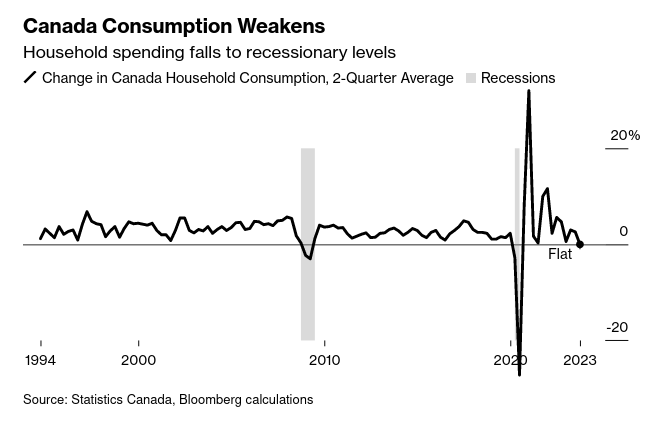December 6, 2023
Canada's economy
Canada's economy is not doing super great.
Manufacturing activity is down and new orders are down (showing a slowing of activity will continue for a bit).
The economy is not in technical recession because of the stats being adjusted up as new data came in.
There has also be a significant downward trend in spending.

These economic impacts are not isolated to Canada, they are a global phenomenon much like inflation.
This is not surprising. The central banks and the policy actions of the government have been mostly coordinated across the Western leading capitalist countries.
That is, all except the USA which continues to finance the building of production projects at a slightly higher rate than everywhere else.
However, it is unlikely that any economy will avoid the economic doldrums brought on by the particular mix of monetary and economic policy.
Child care
Statistics Canada has release some child care stats for 0-5 years old.
The main takeaways are below, but the top line is this:
As costs of child care have started to drop across the country (outside of Quebec), use of registered child care centres has gone up with a statistical significance at the expense of all other modes of child care.
This has happened, however, as child care access/use has gone down significantly across the country.
Centre-based Child Care
- 2019: 31%
- 2023: 34%
The reasons not in child care break down like this:
- 35% preferred to have a parent stay at home
- 28% on parental leave
- 26% because child was on a waitlist (up from 19% in 2022)
Those not using child care:
- 23% find cost of child care to be too high
-
18% because they cannot find child care (an increase from 7% in 2019)
- 78% of centres had wait lists
This even though average child care costs per month were:
-
$587: home based child care
- 53% unlicensed
- includes using a relative
- $2,222: nanny
-
$293: relative
- 59% of relatives charge nothing, so this is heavily skewed
Canada had a significant drop in the use of child care. Part of the reason is work from home, but even with that we find that women work from home and put their kids in child care if it is affordable.
- change their work or study schedules: 34%
- work fewer hours: 33%
- postponing a return to work 31%
All of the national numbers are somewhat skewed by Quebec being about 1/3rd the cost of anywhere else. These costs have gone up recently and use to child care has fallen accordingly.
Quebec use of child care:
- 2019: 78%
- 2023: 75%
While this change was not statistically different, it does measure as a trend.
Ontario measured a significant difference with a drop:
- 2019: 54%
- 2023: 48%
Things are not looking to get better in access to childcare spaces because employment in childcare is has declined and will decline further in the next few years.
Compared to 2019, we have seen a drop in early childhood educators and assistants:
- New registrants in certification program: -32.1%
- Certifications: -14.3%
This does not bode well for the childcare plan of the federal government.
I blame the wages for ECEs (someone with a diploma) for this decline. Even in BC, an ECE will earn on average $41,629 a year. There are 12,410 empty positions available right now in BC. It seems to me that this will not change until we treat childcare workers with more respect.